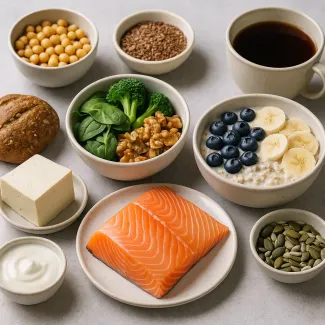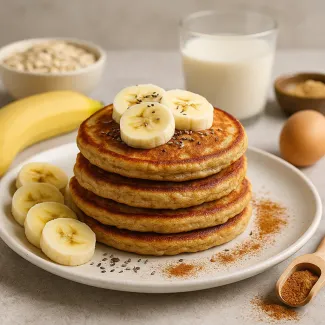
Everyday strategies to boost energy and stay resilient in your 30s
Practical ways to support vitality, focus and hormonal health through daily choices
The transition into your 30s often marks the beginning of a more conscious relationship with your body. Unlike the fast-paced resilience of your 20s, this decade introduces subtle physiological changes that demand deeper attention: slower recovery, shifts in hormonal balance, and increased sensitivity to stress, sleep and diet. While these changes are completely natural, how you respond to them determines whether you maintain vitality or gradually slide into low energy, mood swings and digestive imbalances.
Instead of relying on quick fixes, the goal in your 30s should be to build a strong foundation through daily habits that enhance mental clarity, hormonal stability, digestion and immune strength. This article provides real-life strategies that are easy to apply but create deep long-term effects on your energy and resilience. Whether you're managing a career, raising children, or striving for personal growth, the following habits will keep your mind sharp, body balanced, and motivation steady.
Reclaim morning energy by regulating your sleep-wake cycle
Sleep in your 30s begins to play a different role than before. While late nights were manageable in your 20s, they now contribute to daytime fatigue, mood dips, and increased sugar cravings. A consistent circadian rhythm becomes essential. Waking up and going to bed at roughly the same time—even on weekends—helps to stabilize cortisol production, regulate melatonin release, and support thyroid activity, which is crucial for energy.
Avoid screen exposure at least 90 minutes before bedtime to encourage natural melatonin secretion. Instead, incorporate a winding-down ritual: herbal tea, light stretching, journaling or dim lighting. Prioritize 7–9 hours of restorative sleep rather than just clocking in hours in bed. Deep sleep is when cellular repair, detoxification, and memory consolidation occur—these processes are foundational to vitality.
Balance blood sugar levels to prevent energy crashes
One of the most overlooked causes of low energy and poor focus in your 30s is unstable blood sugar. Irregular meals, processed carbs and sugary drinks can cause sharp glucose spikes followed by crashes that leave you feeling sluggish, anxious or irritable. Stabilizing your blood sugar can have immediate effects on how you feel throughout the day.
Start your morning with a protein-rich breakfast—think eggs, Greek yogurt, chia pudding with seeds or a protein smoothie with healthy fats. Avoid starting your day with pastries, cereal or just coffee. These create glucose surges that set up the rest of your day for dips and cravings.
Combine fiber, protein and fats in every meal. For example, pair fruit with nut butter, or whole grains with legumes and avocado. Such combinations slow glucose absorption and promote steady energy levels.
Nourish hormonal balance with whole foods and essential nutrients
Your 30s are a hormonal crossroads. Whether you’re planning pregnancy, navigating PCOS, experiencing early signs of estrogen dominance or thyroid irregularity, your daily choices can restore hormonal rhythm without medication. Food is one of the most powerful ways to influence your endocrine system.
Prioritize cruciferous vegetables (broccoli, cauliflower, arugula) which support estrogen detoxification in the liver. Incorporate zinc-rich foods (pumpkin seeds, shellfish, eggs) to support progesterone production. Don't neglect iodine, selenium and B-vitamins, which support thyroid health—a gland that significantly controls energy and weight in your 30s.
Eliminate or reduce ultra-processed foods that contain endocrine-disrupting compounds, like refined seed oils and preservatives. Replace them with anti-inflammatory fats (olive oil, fatty fish, flaxseeds) and colorful fruits and vegetables for antioxidants.
Improve digestion to support mental clarity and nutrient absorption
Your gut isn’t just about digestion—it’s the hub for immune activity, neurotransmitter production, and hormonal conversion. If you experience bloating, constipation or frequent fatigue after meals, your gut is likely calling for attention.
Daily habits such as chewing thoroughly, avoiding eating while distracted, and incorporating bitter foods like arugula or lemon water can stimulate digestive enzyme release. Add fermented foods like kimchi, sauerkraut or kefir to support a diverse gut microbiome.
Make room for a 12–14 hour overnight fast between your last evening meal and your next breakfast. This gives your digestive system time to reset and promotes gut lining repair. A well-functioning gut means better nutrient absorption, sharper mental focus and reduced inflammation.
Prioritize muscle maintenance with strength-focused movement
While cardio is valuable, muscle mass becomes your energy reserve and metabolic anchor in your 30s. After this decade, you naturally begin to lose muscle each year unless you actively maintain it.
Incorporate resistance training at least 2–3 times a week. This can be bodyweight workouts, free weights, resistance bands or yoga. Strength-focused activity boosts mitochondrial health, balances insulin, and stimulates growth hormone production—all vital for sustained energy and body tone.
Movement also impacts mental health. Strength workouts release endorphins and reduce cortisol, improving your ability to manage stress. The stronger your muscles, the easier it becomes to sustain energy, posture, and joint health.
Hydrate intelligently to support metabolism and brain function
By the time you feel thirsty, you're already mildly dehydrated—and in your 30s, subtle dehydration affects brain performance, focus and skin appearance. But hydration isn’t just about drinking more water.
Start your day with a glass of water and a pinch of unrefined salt or lemon to rehydrate after sleep and restore minerals lost overnight. Throughout the day, sip water between meals rather than during them to support digestion.
Limit caffeinated beverages to earlier hours. Coffee can be dehydrating and overstimulate cortisol if overused. Balance it with herbal infusions or coconut water for natural electrolytes. Proper hydration supports kidney function, detox pathways, and joint lubrication.
Manage stress with daily self-regulation techniques
Chronic stress in your 30s may no longer be loud or dramatic—it can be low-grade but persistent, slowly depleting your vitality. Stress leads to adrenal dysregulation, blood sugar instability, and impaired digestion.
Incorporate micro-moments of relaxation: deep breaths before meals, a 5-minute walk after work, or moments of gratitude journaling. These small pauses help shift your nervous system from “fight or flight” into rest and repair mode.
Use tools like vagal toning (humming, cold exposure, chanting) to stimulate the parasympathetic nervous system. Even short daily practices can lower cortisol levels and improve your ability to respond calmly to challenges.
Foster mental energy with digital boundaries and focused breaks
The digital world saps energy in ways we don’t always notice. Constant notifications, blue light, and mental multitasking drain focus and dopamine reserves, leading to mental fog and motivation dips.
Reclaim your attention by batching notifications, setting screen curfews, and taking intentional breaks every 90–120 minutes. Step outside, stretch, or perform a brief non-screen-related activity. These pauses reset your mental clarity and boost productivity.
Avoid jumping between tabs or apps. Each switch taxes your prefrontal cortex. Create single-task windows, especially for deep work or reflection. Mental sharpness depends on your brain's ability to rest between periods of focus.
Use targeted supplements to support foundational systems
While food should always come first, your 30s may reveal nutrient gaps due to lifestyle, stress or hormonal shifts. Strategic supplementation can restore reserves and increase resilience.
Commonly needed nutrients include magnesium (for sleep and muscle relaxation), omega-3s (for inflammation and mood), vitamin D3 (for immunity and hormone regulation), and B-complex (for energy metabolism). Consider including adaptogenic herbs like ashwagandha or rhodiola to buffer the effects of stress.
Before supplementing, track your energy levels, cycle patterns, and digestive changes. Not every supplement is necessary, but targeted use based on your body’s signals can prevent chronic fatigue or hormonal imbalance from creeping in.
Support your immune system with consistent low-inflammation habits
Your immune system thrives on stability, not surprises. Instead of relying on seasonal boosts, cultivate daily behaviors that keep your immunity strong year-round. Chronic low-grade inflammation—often unnoticed—can weaken immunity and reduce energy.
Eat anti-inflammatory staples: wild berries, turmeric, leafy greens, and extra-virgin olive oil. Minimize alcohol, sugar and processed meat. Get at least 20 minutes of outdoor exposure daily—vitamin D and circadian rhythm alignment go hand-in-hand with immune function.
Sleep, movement, gut health and emotional balance are all interconnected with immunity. Supporting these areas consistently leads to fewer colds, faster recovery and overall vitality.
Create emotional boundaries to protect your energy
One of the most underrated habits for vitality in your 30s is learning to say no without guilt. Emotional exhaustion is often a result of overcommitment, people-pleasing, or blurred personal boundaries. Setting clear limits preserves your emotional bandwidth and allows you to show up fully where it matters.
Review your weekly commitments and ask: What drains me? What nourishes me? Begin removing or modifying energy drains, even small ones. Your 30s are not about doing more, but doing what aligns with your values and supports your energy.
Practice self-compassion, especially during hormonal fluctuations or emotionally charged periods. Your energy is a resource—protect it with the same care you'd give to physical health.
Build intentional routines instead of reactive habits
Your 30s often feel “busy” by default. Between career growth, family roles, social pressure and responsibilities, it’s easy to live in reactive mode, constantly putting out fires. But long-term vitality requires structure and intention.
Start by defining morning and evening anchor habits. These don’t have to be long, but they should be predictable and supportive. For example: a glass of lemon water, five deep breaths, 10 minutes of movement, or planning your top priorities. At night: screen off at 9 pm, stretching, gratitude, and consistent bedtime.
When your day starts and ends with grounding habits, everything in between becomes more manageable. Consistency is more powerful than intensity when it comes to well-being.
Maintain cognitive vitality through curiosity and learning
Mental energy isn't just about avoiding fatigue—it’s about feeding your brain with novelty and challenge. In your 30s, brain neuroplasticity is still strong. Stimulating your mind through reading, learning new skills, or creative hobbies builds cognitive reserve that protects against burnout and aging.
Make time weekly to engage your curiosity. This can be through audiobooks, learning a language, cooking a new recipe, or exploring nature. Curiosity activates dopamine circuits that naturally boost motivation and emotional resilience.
Avoid excessive passive scrolling or binge-watching, which can flatten your mental reward system. Instead, lean into active participation in things that inspire growth and discovery.
Anchor your energy with consistent daily rhythms
Ultimately, your body thrives on predictability. Eating, moving, resting and working at roughly the same times daily creates biological harmony. This supports hormonal flow, stable energy, better digestion and deep sleep.
Create a light-based rhythm by exposing yourself to morning sunlight and dimming lights in the evening. This strengthens your circadian signals, making your entire hormonal system more efficient.
Small shifts in timing—like walking after lunch or finishing dinner before 8 pm—create compounding effects. Over time, these rhythms help you feel more energized, focused and emotionally centered throughout the day.
Stay connected to your purpose for sustained vitality
Vitality isn’t only physical—it’s emotional and spiritual too. Having a sense of purpose is one of the most underrated energy sources in your 30s. It acts as a compass that directs your habits and gives meaning to your daily actions.
Take time regularly to reflect: What energizes me? Where do I feel aligned? When your actions are tied to your values, your motivation becomes intrinsic, not dependent on external rewards. This type of energy doesn’t burn out.
Purpose can be found in your work, relationships, creativity, or contribution. It doesn’t have to be grand—it just has to be real. Authentic vitality grows where there is alignment between what you do and who you truly are.





